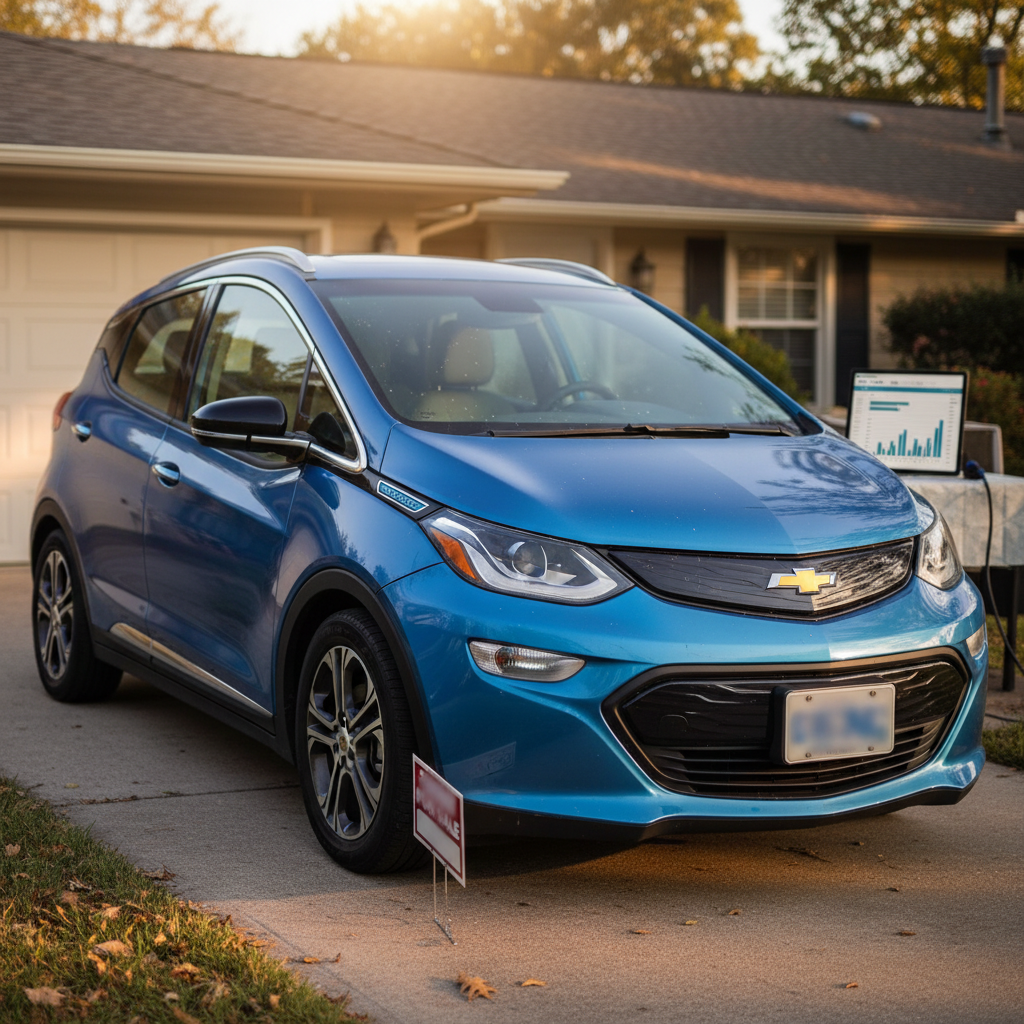When you type “used car around me” into a search bar today, you’re not just competing with other shoppers, you’re also navigating a market that’s rapidly shifting toward electric vehicles (EVs). Prices, incentives, and technology have changed dramatically in the last few years, and the smartest move in many U.S. markets in late 2025 is a used EV instead of a new gas car.
Why this matters now
Why Used EVs Are Shaping the Used Car Market Around You
If you’re looking for a used car around you, odds are you’re seeing more electric options than ever before. Years of aggressive leasing, fast model cycles, and expiring tax credits have pushed a wave of late‑model EVs into the used market, often priced well below comparable new gas cars.
The Used EV Shift in 2025
Why this helps you as a buyer
Where to Search When You Type “Used Car Around Me”
Typing “used car around me” usually drops you into a maze of overlapping listings: franchise dealers, independent lots, big national platforms, and private sellers. Each has trade‑offs, especially for EVs, where battery health and charging history matter as much as cosmetic condition.
Main Places to Look for a Used Car Around You
What each channel gets right, and where to be careful, especially with EVs.
Local Dealers
Pros
- Cars are nearby for quick test drives.
- Some offer limited warranties and on‑site financing.
Cons
- Many still treat EVs like gas cars, little focus on battery health.
- Pricing can be opaque, with add‑ons and doc fees.
Big National Marketplaces
Pros
- Huge selection, searchable by distance, price, and EV model.
- Home delivery and return windows are increasingly common.
Cons
- Listings often don’t include verified battery data.
- Fees can be baked into prices in ways that are hard to see.
Private Sellers & Local Apps
Pros
- Potentially the lowest prices; you negotiate directly.
- Great for finding older EVs or niche trims nearby.
Cons
- Almost never any warranty or return policy.
- You’re on your own to evaluate battery health and title status.
Use local + nationwide search

How to Compare Used EVs vs Gas Cars Near You
A used EV won’t be the right answer for everyone, but if you’re mostly driving locally and have access to home or workplace charging, it’s often the best value when you’re cross‑shopping used cars around you. The trick is to compare the total cost of ownership, not just the sticker price.
Used EV Advantages
- Lower running costs: Electricity is typically cheaper than gasoline per mile, and EVs have fewer moving parts.
- Performance: Instant torque and quiet operation make even modest EVs feel quick around town.
- Local emissions: Zero tailpipe emissions are easier on your neighborhood and your garage air.
- Tech features: Many used EVs come with modern driver‑assist and infotainment tech standard.
Gas Car Advantages
- Refueling speed: If you can’t charge at home, gas is still more convenient in many regions.
- Long‑distance flexibility: Road‑tripping is still simpler with gas in some parts of the U.S.
- Upfront availability: In some smaller markets you’ll still see more used gas cars than EVs.
- Known maintenance patterns: Every shop knows how to work on a traditional engine.
Don’t ignore your charging reality
Battery Health: The New “Mileage” for Used EVs
With gas cars, you’re trained to look at mileage and maintenance records. With EVs, battery health is just as important. Two identical used EVs around you can have very different usable range in the real world depending on how they were charged and driven.
- State of Health (SoH): Usually expressed as a percentage of original capacity. An EV at 90% SoH will typically deliver about 90% of its original EPA range in similar conditions.
- Fast‑charge history: Heavy use of DC fast charging can accelerate degradation on some models, especially early designs.
- Climate exposure: Hot climates can be tougher on certain chemistry packs if they lack robust thermal management.
- Software & recalls: Battery‑related recalls or software updates can change available capacity and charging behavior.
What Recharged’s battery report adds
Pricing: What Is a Fair Deal on a Used EV Around You?
Because new EV prices have been volatile and incentives have shifted, used EV pricing can look chaotic when you search for a “used car around me.” The same model can be thousands of dollars apart across different sellers.
How Used EV Prices Typically Compare to New
Illustrative spread you might see on major models when shopping in 2025. Actual values vary by mileage, trim, and region.
| Example Model | Original New MSRP* | Typical 3-Year-Old Used Price | Notes |
|---|---|---|---|
| Mainstream compact EV | $40,000 | $22,000–$26,000 | Deep discounts from original price are common in the current market. |
| Premium EV sedan | $60,000 | $33,000–$38,000 | Luxury EVs often see the sharpest first‑owner depreciation. |
| Small EV crossover | $45,000 | $26,000–$32,000 | Popular family body style; prices depend heavily on battery health. |
Use this as a directional guide, then validate against real listings and any available market reports.
Look past the monthly payment
Financing and Trade-Ins When Buying a Used EV
Financing a used EV looks similar on paper to financing a gas car, same credit application, similar rates, but there are a few twists worth understanding before you sign anything.
Smart Financing Moves for a Used EV
1. Match loan term to battery warranty
Try not to stretch loans longer than the remaining battery warranty. You don’t want to be paying off a car whose most expensive component is already out of coverage.
2. Consider pre‑qualification
Getting <strong>pre‑qualified</strong> lets you shop used cars around you with a clear budget and fewer surprises at checkout.
3. Verify EV‑friendly lenders
Some lenders still treat EVs as riskier collateral because of outdated assumptions. If rates look unusually high, it’s worth shopping around.
4. Factor in your trade‑in or instant offer
If you’re coming out of a gas car, or another EV, a strong trade‑in or instant offer can offset much of the price gap to a newer electric model.
How Recharged can help
Step-by-Step Checklist Before You Buy a Used EV Nearby
You don’t need to be a battery engineer to buy a used EV confidently. Use this checklist as a simple playbook when you’re comparing options, whether it’s at a local dealer, through a marketplace, or on Recharged.
Pre‑Purchase Checklist for a Used EV
1. Confirm your daily driving needs
Write down your typical weekday miles and your longest regular trip. Make sure the real‑world range of any EV you’re considering comfortably covers this with a buffer.
2. Check home and workplace charging options
Do you have a garage outlet today? Can you install a Level 2 charger? If not, map public charging near your home and usual routes before committing.
3. Review battery health and warranty
Ask for a <strong>battery health report</strong> and written proof of remaining battery warranty. On Recharged, this is part of the Recharged Score Report.
4. Inspect tires, brakes, and suspension
EVs are heavier than comparable gas cars, which can affect wear. Even if the motor needs less maintenance, tires and brakes still matter.
5. Test all charging equipment
Confirm the car includes the correct home charging cable and, if advertised, any adapters. Plug in during your test drive visit if possible.
6. Drive it like you’ll actually use it
On your test drive, mimic your real use: highway speeds, hills, stop‑and‑go. Pay attention to efficiency readings and how quickly range drops.
Common Pitfalls When Shopping for a Used Car Around You
Most horror stories from people who searched for a “used car around me” and regretted it have less to do with bad luck and more to do with rushing past key details. EVs fix some traditional used‑car problems, but introduce new ones if you’re not paying attention.
Mistakes to Avoid With Used EVs
These are the issues we see most often when buyers shop the broader used‑car market.
Ignoring battery health
Buying a used EV without any verified battery data is like buying a high‑mileage gas car with no odometer.
- Always get an independent report or a platform‑verified diagnostic.
- Be wary of vague claims like “battery is fine” with no documentation.
Focusing only on payment
Dealers know most shoppers anchor on the monthly number.
- Extending loan terms or adding extras can hide a weak price.
- Compare multiple offers with the same term and down payment.
Underestimating charging gaps
Fast‑charging coverage varies widely by region.
- Look beyond glossy app maps and check real‑world reviews.
- If your area is still a charging desert, plan accordingly, or hold off.
Skipping title and history checks
Salvage or flood‑damaged EVs are particularly risky.
- Water damage and high‑voltage systems don’t mix.
- Run a title history report and inspect underbody and connectors.
Red flag checklist
How Recharged Makes Buying a Used EV Simpler
Traditional used‑car retail wasn’t built for EVs. You’re asked to make a long‑term decision based on a quick walk‑around, a short drive, and an odometer reading. Recharged was built to make used EV ownership simple and transparent from the first search to delivery.
What You Get When You Shop Used EVs with Recharged
Designed around the questions EV buyers actually have.
Recharged Score Report
Every vehicle includes a Recharged Score Report with:
- Verified battery health diagnostics
- Fair market price analysis
- Condition and history insights
Fully digital or in‑person
Browse, finance, and sign entirely online, or visit the Recharged Experience Center in Richmond, VA for a hands‑on look.
Nationwide delivery
Find the right car, not just the closest one. Recharged offers nationwide delivery, so the best “used car around me” arrives at your driveway, even if it started across the country.
Flexible selling options
Have a vehicle now?
- Get an instant offer
- Trade it in toward your next EV
- Or list via consignment with expert help
EV‑specialist support
Talk to people who live and breathe EVs, not just “internet sales.” Recharged specialists can unpack battery data, charging options, and model trade‑offs.
Aligned incentives
Transparent pricing, clear diagnostics, and expert guidance are baked in, so you don’t have to fight through the old‑school dealership playbook.
FAQ: “Used Car Around Me” (Especially EVs)
Frequently Asked Questions
Key Takeaways If You’re Shopping for a Used Car Around You
Searching for a “used car around me” in 2025 is very different from doing the same search a decade ago. The rise of used EVs means you can often get more technology, lower running costs, and a cleaner commute for the same budget, if you know how to evaluate battery health, charging options, and pricing.
Focus on your real‑world use, demand transparent battery data, look past the monthly payment, and don’t rush just because a seller pushes urgency. And if you want a path built specifically for used EVs, with verified battery diagnostics, fair market pricing, EV‑savvy support, and delivery to your door, consider starting your search with Recharged instead of wrestling with a dozen generic “used car around me” tabs.



